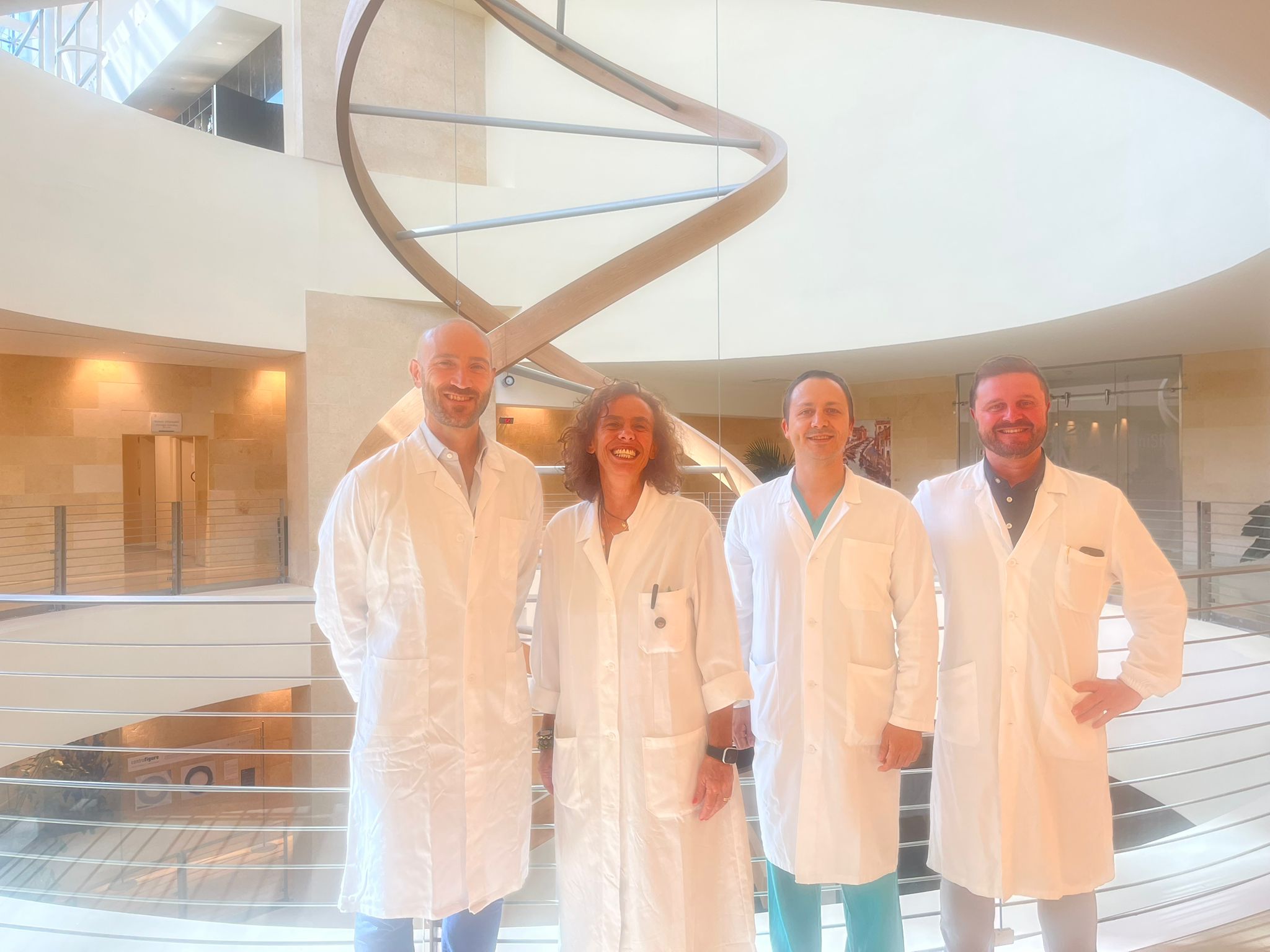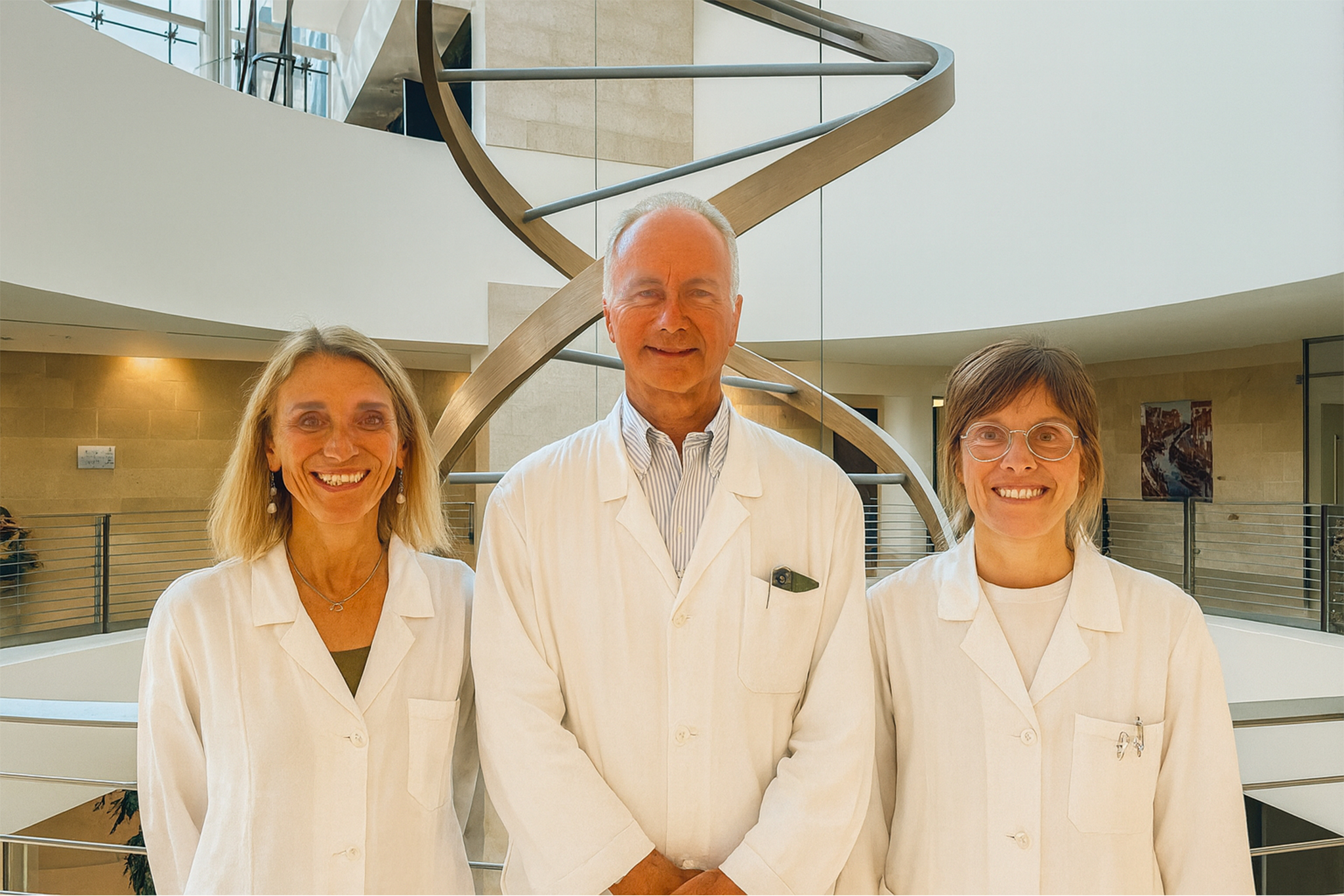News
Two San Raffaele Projects Win "From Bed to Bench" Grant for Pancreatic Cancer and Lysosomal Storage Diseases
Congratulations to Professor Chiara Bonini, group leader of the Experimental Hematology lab at San Raffaele Hospital and Professor of Hematology at Vita-Salute San Raffaele University, and to Professor Alessandro Aiuti, deputy director of the San Raffaele Telethon Institute for Gene Therapy (SR-Tiget), Chief of Clinic of the Pediatric Immunohematology Unit of the Hospital, and Professor of Pediatrics at Vita-Salute San Raffaele University, for being among the winners of the 2024 "From Bed to Bench: the way to innovation" grant promoted by the Regional Foundation for Biomedical Research (Fondazione Regionale per la Ricerca Biomedica, FRRB).
The two projects, funded with 2 million euros each, have ambitious goals. The one led by Professor Bonini aims to understand the cellular and molecular characteristics that make pancreatic ductal adenocarcinoma one of the most insidious and difficult tumors to treat, to inform the design of more effective immunotherapy cell products.
The project headed by Professor Aiuti aims to study the skeletal alterations that occur in lysosomal storage diseases, which are cellular metabolism disorders that lead to the abnormal accumulation of undigested molecules in various body tissues, with serious consequences for the organism.
Bypassing Pancreatic Cancer Resistance to Cellular Immunotherapy


From left to right: Prof. Renato Ostuni, Chiara Bonini, Dr. Giulio Belfiori and Prof. Stefano Crippa
Pancreatic ductal adenocarcinoma is the most common form of pancreatic cancer, and to date, its treatment remains one of the most significant challenges in medicine.
As with other solid tumors, pancreatic cancer resists conventional immunotherapy with CAR-T cells or TCR therapy, which aims to enhance the immune response against cancer cells through the genetic engineering of the patient's own T lymphocytes.
While these immunotherapeutic strategies have revolutionized the treatment of some hematological cancers, their application in the context of solid tumors has not been implemented in clinical practice yet.
This is due to two reasons:
- The lack of specific therapeutic targets for solid tumors
- The tumor's intrinsic characteristics, which create molecular, physical, and cellular barriers against the effective action of T lymphocytes
The project "Deciphering and targeting the immunological niche in PDAC" aims to integrate molecular biology techniques and artificial intelligence to study the immunological characteristics of pancreatic ductal adenocarcinoma and find new therapeutic targets to bypass the tumor barriers that hinder the immune response.
"The idea is to deeply study the molecular characteristics and immunological profile of pancreatic cancer and the environment that surrounds it. We want to understand the mechanisms that hinder an effective response to immunotherapy and search for new molecular targets to act upon. Based on this knowledge, we plan to develop new CAR-T or TCR cell therapies in the future to combat not only pancreatic cancer but potentially other solid tumors as well," comments Professor Bonini, who is leading the study together with Professor Stefano Crippa, consultant pancreatic surgeon in the Pancreas Surgery Unit at San Raffaele Hospital and associate professor of Surgery at Vita-Salute San Raffaele University, in collaboration with Professor Renato Ostuni, group leader of the Genomics of the Innate Immune System lab at SR-Tiget and associate professor at Vita-Salute San Raffaele University.
Other collaborators on the project include Dr. Monica Casucci, group leader of the Innovative Immunotherapies lab, and Dr. Giulio Belfiori, consultant pancreatic surgeon, in the Pancreas Surgery Unit at our hospital.
The project is also being carried out in collaboration with the group of Dr. Craig Glastonbury at the Human Technopole in Milan.
Studying, Predicting, and Treating Skeletal Dysplasia in Lysosomal Storage Diseases


From left to right: Prof. Maria Ester Bernardo, Prof. Alessandro Aiuti and Dr. Stefania Crippa
Lysosomal storage diseases are disorders of cellular metabolism caused by the accumulation of undigested molecules in lysosomes, the "garbage collectors" that remove and degrade waste within the cell. This severely damages several body tissues, including bone tissue, leading to skeletal alterations known as skeletal dysplasia.
Due to the progressive nature of these diseases and the late appearance of associated symptoms, we currently have no effective cures for patients who suffer from them. Moreover, our understanding of the cellular mechanisms that drive the abnormal bone remodeling underlying skeletal dysplasia is scarce.
The project "Diagnosis, pathogenesis and innovative therapies for metabolic lysosomal storage Diseases with skeletal involvement" aims to study the biological and clinical characteristics of skeletal dysplasia in patients with these rare diseases to develop a neonatal screening for early diagnosis and timely treatment. The project also aims to develop gene therapy strategies to correct the genetic defects that underly these diseases.
"With this project, we aim to leverage the synergy between research and clinical practice that characterizes San Raffaele to study the skeletal alterations underlying lysosomal storage diseases. The idea is to use this knowledge both to develop early diagnosis and therapeutic strategies and to understand the development of the multi-systemic alterations that can affect other body tissues in parallel to skeletal dysplasia," comments Professor Aiuti, who is leading the project with Professor Maria Ester Bernardo, clinical research coordinator in the Clinical Research Unit at SR-Tiget and associate professor of Pediatrics at Vita-Salute San Raffaele University.
Like the previous one, this is also a project that benefits from the multidisciplinary collaboration among various researchers at San Raffaele, including Professor Luigi Naldini, director of SR-Tiget and professor at Vita-Salute San Raffaele University, Dr. Stefania Crippa and Dr. Francesca Tucci, research associate and a pediatrician, respectively, at SR-Tiget.
The project also involves collaboration with Dr. Marta Serafini, group leader at the Tettamanti Research Center of the IRCCS Ospedale San Gerardo dei Tintori in Monza, and Professor Gianvincenzo Zuccotti, director of the Pediatrics department at ASST Fatebenefratelli Sacco.
Published on: 18/09/2025
